
Guests
- Ricardo Alarconpresident of the Cuban National Assembly.
We go to Havana for an exclusive interview with the president of the Cuban National Assembly, Ricardo Alarcon. The Cuban and Venezuelan governments have repeated their calls for former CIA operative Luis Posada Carriles to be extradited to stand trial for his role in the 1976 bombing of a Cuban airliner that killed 73 people. Posada was scheduled to go on trial in Texas on Friday for immigration fraud, but a U.S. federal judge tossed out the indictment on Tuesday, making Posada a free man. Alarcon also talks about the plight of the Cuban Five, Guantanamo Bay and the health of the ailing Cuban president, Fidel Castro. [includes rush transcript]
Transcript
JUAN GONZALEZ: The Cuban and Venezuelan governments have repeated their calls for former CIA operative Luis Posada Carriles to be extradited to stand trial for his role in the 1976 bombing of a Cuban airliner that killed 73 people. Posada was scheduled to go on trial in Texas on Friday for immigration fraud, but a U.S. federal judge tossed out the indictment Tuesday, making Posada a free man. Critics of the Bush administration’s handling of the Posada case say it demonstrates a U.S. double standard on terrorism. Posada has been linked to several acts of terrorism in addition to the 1976 airline bombing. He is currently being investigated by a grand jury in New Jersey for masterminding a string of hotel bombings in Havana in the 1990s. Evidence has also emerged linking him to a plot to assassinate Cuban leader Fidel Castro.
AMY GOODMAN: Meanwhile, pressure is growing in Washington for President Bush to take action against Posada. On Wednesday, Democratic Congressmember William Delahunt urged Bush to detain Posada and certify him as a terrorist under the PATRIOT Act. Delahunt said the U.S. government should not be giving sanctuary to a man he described as “one of the Western hemisphere’s most notorious killers.” Democratic Congressmember Jose Serrano of New York also condemned the Bush administration’s handling of the Posada case. Serrano said, “It further weakens our moral standing in the world, as we will undoubtedly be seen as being biased in our ongoing war on terrorism.”
We go now to Havana for an exclusive satellite interview with the president of the Cuban National Assembly, Ricardo Alarcon. Welcome to Democracy Now!
RICARDO ALARCON: Good morning, Amy.
AMY GOODMAN: It’s good to have you with us.
RICARDO ALARCON: Nice to be here.
AMY GOODMAN: First, your response to the release of Posada and also the dropping of the charges against him, albeit they were just on immigration issues.
RICARDO ALARCON: Well, I think that what happened the other day in El Paso was a decision by Judge Cardone that put an end to a charade that was organized by the administration. They had spent two years not indicting Posada, not prosecuting him for his real crimes, but playing games with these alleged migratory infractions that, according to the judge, in case he were to be found guilty of those violations, he would get only half a year or one year in prison, and he has served already two.
The issue now is very simple. I think that the situation is now more clear. He is a free man, because the charges were dismissed — the migratory phony charges. Now, it is up to the U.S. administration to abide by its obligations, according to international treaties, according to American law, to prosecute a terrorist or to allow him to go free. I think that the issue is now more clear than it was before, due to the maneuvering of the administration.
JUAN GONZALEZ: Here in the United States, obviously, many Americans are still not aware of the role of Posada Carriles in past terrorism actions, and it’s been caught up quite a bit, obviously, in the continuing conflict between the U.S. government and the government of President Chavez and, of course, of your government. But the indictments of him in Venezuela predate the Chavez administration, don’t they? Could you talk a little bit about those original indictments?
RICARDO ALARCON: The destruction at midair of a Cubana airplane in 1976 took place at a time where Mr. Hugo Chavez was a teenager beginning his military education. Nobody knew about him. It was a very pro-American administration in Venezuela, led by President Carlos Andres Perez, who asked publicly — went publicly at the U.N. to the U.S. government as friend: “Please help us to make justice in this case, because people are saying in the Caribbean that the CIA was involved on that.” It was another Venezuelan government.
It was the Venezuelan highest court who declared Mr. Posada a fugitive of justice when he “escaped” — quote/unquote — from prison before the court, the Venezuelan court, having sentenced him or having concluded the process. Remember that this man almost immediately went from a Venezuelan prison to Ilopango base in San Salvador, and he reappeared as a key element in the Iran-contra affair, distributing weapons to the contras at that time — the Nicaraguan contras at that time, when the U.S. Congress had forbidden that, and violating the law from the White House. Then this man disappeared again, continued to be a fugitive of justice, and reappeared two years ago in Miami.
What is the situation now? After 9/11, the U.S. promoted a resolution that is mandatory at the Security Council that, among other things, establishes that arguments of a political nature may not be admitted to deny extraditions to individuals associated with or allegedly associated with terrorist actions. And that is exactly what the U.S. is doing at this moment. They do not have any option, according to international law, either to extradite Posada to Venezuela to continue the trial he was going through there 20 years ago or to prosecute him and present him to an American court of law, but on those real crimes, not on phony migratory charges, and that’s in a very summary fashion.
But let me tell you something else. Last week, a number of documents were declassified. They appear now in the National Security Archive’s website, especially documents coming from the authorities from two governments in the Caribbean: Trinidad and Tobago and Barbados. Remember that this man and his group were not just involved in destroying a Cuban plane, a Cuban plane, by the way, in which a number of young Guyanese were traveling and were killed. Before the plane attack, these same individuals attacked several Trinidadian buildings, institutions, several Barbadian buildings and institutions, Jamaicans and so on. In other words, what the U.S. is doing by not prosecuting Mr. Posada on that is not only a bilateral matter with Cuba or with Venezuela, it’s also an insult to the Caribbean nations, which together we worked, we cooperated in the ’70s, and we decided collectively at an international conference that was held in Port of Spain, the capital of Trinidad and Tobago, that Venezuela will prosecute and have the trial.
Barbados investigated the technical aspect of the destruction of the plane, and they succeeded in determining that it was the result of bombs that were exploded at the passengers’ cabin of the plane. Trinidad and Tobago, on its part, had detained the two material authors of that act, and they made the criminal investigation and provided plenty of evidence that were submitted to the Venezuelan tribunal. In other words, it was an example of international cooperation involving the whole Caribbean area.
And now the U.S. is insulting the Caribbean nations, the Cuban people, of course, the victims of that heinous act, but also the American people, because it is ignoring its very clear obligations either — I repeat, either — to extradite or to prosecute, according to the Montreal convention on crimes against civil aviation. There are only two choices, not a third one. You cannot find in that convention a third option. Having your friend walking around in Miami, that’s completely illegal. It’s an insult to humanity.
AMY GOODMAN: We’re talking to Ricardo Alarcon, president of the Cuban National Assembly. He is sitting outside in Havana, Cuba. When we come back, we’ll continue our conversation, and then we’ll go to Washington, D.C., from terror in the skies to terror in the seas, and talk about a man selling weapons to the U.S. government who was involved in the bombing of the Rainbow Warrior. That was the Greenpeace ship in 1985 in Auckland Harbour in New Zealand. He is living in McLean, Virginia. Stay with us.
[break]
AMY GOODMAN: We continue our exclusive interview with Ricardo Alarcon by satellite outside in Havana, Cuba. Ricardo Alarcon, president of the Cuban National Assembly, long talked about as the number three man in Cuba. We’re talking about the release of Luis Posada Carriles, the actual dropping of all charges against him. He was supposed to stand trial in El Paso, Texas, tomorrow on immigration fraud, long implicated in the 1976 bombing of the Cubana civilian airliner flight that killed all 73 people on board, among those dead, the entire Cuban fencing team.
Ricardo Alarcon, one of the bits of information that came up in the lead-up to the trial that now will not happen is the discussion to try to stop Posada from talking about his CIA connections, the fact that he was on the CIA payroll. What do you know about this?
RICARDO ALARCON: Well, the government presented a motion asking for complete exclusion of any reference to Posada’s connections with the CIA, arguing that those links were finished in 1976. Mr. Posada himself, on a legal document in reply to that motion, rejected that, and he said that he has been working for the CIA beyond that date. To quote him, more or less, he said, “I have been involved with them for more than 25 years.” That means that — and he made, as a point of reference — he recalled — he said, as a matter of history, that the Iran-contra affair, that was well in the '80s, and he was working for the CIA and — not only the CIA — the White House, remember, at that time. That means that according to him, he was a CIA agent at the time he masterminded the destruction in midair of a civilian airplane. And I imagine why the U.S. government, the prosecutors, didn't want any discussion about CIA connection at that trial, at that phony trial, by the way, that now doesn’t exist anymore due to the decision of the judge.
JUAN GONZALEZ: And also, President Alarcon, the issue of whether he is retired from his activities in terrorism — clearly, about two years ago in Miami, one of his major backers — Santiago Alvarez is one of his financial backers — was arrested with a huge cache of weapons and explosives, so it would seem to indicate that at least that there is still some continuing activity of those who are seeking to foment terrorism against Cuba and other progressive movements in Latin America.
RICARDO ALARCON: More than that, Juan. I don’t know if you followed some news that came out from Miami this week. Santiago Alvarez and Mr. Mitat found an agreement with the prosecutors, the federal prosecutors, to reduce their very low sentences. They got three years and four years. Now, that will be reduced — do you know at the exchange of what? A few dozens of automatic weapons, some C4 explosives, some bombs, some other weaponry. That means these guys were found with a lot of weaponry, illegal weaponry; now — obviously they have more — they give another amount and, in exchange of that, their sentence will be reduced. How much do they still have in hiding in Miami? And that’s a news of this week. That’s Monday, I think.
AMY GOODMAN: Ricardo Alarcon, what about the FBI coming to Cuba and the congressmembers and senators who are objecting to the FBI going to Cuba to gather information about Luis Posada’s crimes and links to terrorism?
RICARDO ALARCON: Well, let me tell you, first of all, that it is true that they came here, and they got information that they were seeking. And I would like to add that that was not the first time. We have always been prepared and advocating international cooperation in the struggle against terrorism. Remember that in 1997, ’98, a delegation from the FBI came down here after some bombings in Havana hotels and some tourist resorts down here in Cuba. At that time, we got in contact with President Clinton. We warned him that part of the plans that existed at that moment, which, by the way, have been confirmed by some of the declassified documents that you may find at the National Security Archives, that they were planning again, Amy, again the destruction of civilian airplanes in midair, not Cuban planes, but foreign planes bringing foreign tourists to this country. [inaudible] was ’98.
Nothing happened. No one was indicted. No one was prosecuted. And instead of that, the U.S. authorities, the FBI, arrested five Cubans who were peacefully, without harming anybody, unarmed, were gathering precisely the information we transmitted to the FBI. They had been doing that since that time and very recently down here in Havana, and we are still waiting. What is the U.S. going to do? Are they going to abide by their international obligations, or again we’ll have to wait and see until another attack, another destruction, happens?
JUAN GONZALEZ: Well, your intelligence activities in the past have uncovered several plots. I seem to recall that back in 2000, when President Castro was in Panama for the Iberian Summit, that he then announced that your intelligence had discovered that Posada Carriles was in Panama at that very moment plotting more attacks, and some explosives were found. Your sense of — do you feel that your country basically is having to continue to ferret out these terrorists with no assistance from the United States or any other major nations?
RICARDO ALARCON: I didn’t get completely the question, Juan.
JUAN GONZALEZ: Is it your sense that your country is being forced to try to do its own intelligence to ferret out, to discover these plots with no assistance at all from the United States or other major countries?
RICARDO ALARCON: Of course. Of course. The whole process around Mr. Posada is the best demonstration of the innocence of our five comrades now arrested or in prison in the U.S. It’s the best proof of the need of defense that we have. It’s a principle of national and international law, the so-called “doctrine of necessity.” In some circumstances, you need to violate some minor regulations, that they did, in order to save a more important value — in this case, human lives. Certainly, you have Mr. Posada back in Miami, together with his old pal Mr. Orlando Bosch, who was part of a President Bush — in a few weeks, maybe, they will be joined by Mr. Santiago Alvarez and Osvaldo Mitat to continue playing with the rest of the C4, with the rest of the weaponry that they kept.
And what can we do? Well, on the one hand, we tried — we have tried time and again to persuade the U.S. authorities to recall then their obligations: Please try to stop this, please try to avoid that incident to take place. And how could we do that? By human intelligence, by having people that sacrifice their lives, that at a very high price, in terms of their individual welfare, abandon their families to penetrate those groups to find out, to learn and to help us communicate with the FBI authorities to see if they would stop those actions. I think it’s absolutely clear. We have not only that right, we have that need. The U.S. now is — I think everybody there accepts the concept of human intelligence, that if somebody had to learn about 9/11, you may have been able to avoid that. And the five comrades, the five compatriots that are in prison in the U.S. saved many lives. They helped us to know in advance and to reduce the consequences, in some cases sharing the information with the FBI.
AMY GOODMAN: We’re talking to Ricardo Alarcon, president of the Cuban National Assembly. He’s in Havana. What about President Fidel Castro? How is his health right now? Many expected to see him at the May Day celebration. He didn’t show. He hasn’t been seen in public since July 31, 2006, since handing over power to his brother Raul. How is his health, Mr. Alarcon?
RICARDO ALARCON: He continues to recover, Amy. I can tell you that he’s doing pretty well. He has — you can see in the most recent photograph, he has gained weight. He’s — physically speaking, his situation has improved a lot and continues to improve. And at the same time, well, he has just published his fifth article in a row. He’s reading a lot, writing, and very much involved in the affairs of the country and the world. And he didn’t show up on May 1, but — you have said I am in the outside in Havana. It is just 8:30, a little bit more. At that time was the parade, and I can assure you that the temperature down here is very, very high. To be standing there for a couple of hours perhaps was not the appropriate thing to do for a person that is following a certain discipline of advice by his doctors. I wish I would have been also reading a book instead of supporting this tremendous sunshine.
AMY GOODMAN: Have you seen him recently? And what actually is wrong with Fidel Castro?
RICARDO ALARCON: Well, I will not move from what we have said. Remember that this is the man against whom more attempts on his life has been made. Mr. Posada is a good example. He has spent decades trying to kill him. We have to be very discreet on what happens to him. But he, himself, explained in his first document, his proclamation, that he had suffered a serious and risky surgery. But he is in the process of recovering from that. That takes time, according to the doctors, and after all, he continues to be the leader of this revolution, continues to be contributing to it in a different manner than the one many people were accustomed. He is less present. He’s not present in demonstrations, and so on, but you can read, you can communicate with him, you can see how he is thinking about certain important issues of today’s world, which implies also that he’s reading a lot and meeting with people to handle certain important issues. It’s a matter of priorities, rather than abandoning responsibilities.
JUAN GONZALEZ: I’d like to ask you also about the situation in Cuba vis-à-vis the rest of Latin America. Clearly, the wave of popular elections bringing in left-of-center governments in Latin America has continued, with the exception perhaps of the Mexican elections and Colombia, but how is Cuba faring in all of this, given the long period of — the special period, the economic problems that the country faced about a decade ago? How is the economy of Cuba faring, given all these changes that are occurring in Latin America?
RICARDO ALARCON: Well, we never had a better relationship with Latin America than at the present time. For many years, we only had diplomatic relations and friendly relations with the small Caribbean nations and Mexico. Now, we have, of course, with the whole Caribbean and practically everybody in Latin America. And it is not only a matter of diplomatic, formal friendly relationships. It’s also an increase in trade, investments, economic cooperation, cultural cooperation. Venezuela, of course, in a very important place, but not only Venezuela, also Brazil, also Argentina, Chile, the rest. That is a reflection of something that goes beyond Cuba, that maybe some people in Washington should begin to think about it.
Latin America is changing, has changed a lot, and is changing. What has happened that the model that was imposed upon our peoples, the so-called neoliberal economic model with its political reflection, has failed, has completely failed and has provoked the eruption of masses of people, reclaiming for a new life, for better conditions, that has led to those changes in the area. And I am sure more changes will come, and that process will not be stopped. In the middle of that, of course, Cuba is enjoying, as I said, the best context than in any other moment of our history.
But apart from that, Cuba has excellent relations with a very important nation in this world named China and with other countries, including Russia, some Europeans and — this legend about isolating Cuba, and so on, reminds me the other lies of the administration about the weapons of mass destruction or an al-Qaeda link with Saddam, and so on. It doesn’t make sense. The U.S. is being defeated, is being isolated on that particular issue. You come down here, you will see investors from other countries, you will see partners from every part of the world.
AMY GOODMAN: Ricardo Alarcon, we just have a minute, but I have a quick question about Guantanamo. Reports that in a post-Castro Cuba, it will be turned into an immigration center for Cubans to come to the United States, but, more importantly, how it’s being used right now as a prison for hundreds of men from around the world. We have 30 seconds.
RICARDO ALARCON: This prison should be closed down immediately, and Guantanamo should be returned to its rightful owner, the people of Cuba. And when we get — it won’t be necessarily after this or that. When justice is made and returned to Cuba, for the first time the Cuban people will be able to use the best, the largest bay in the southern part of our country, which is Guantanamo, which has never been under Cuban control.
AMY GOODMAN: Ricardo Alarcon, I want to thank you for being with us, president of the Cuban National Assembly, speaking to us from Havana.

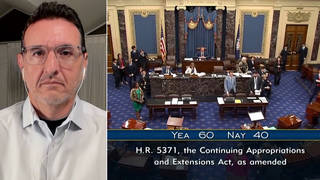
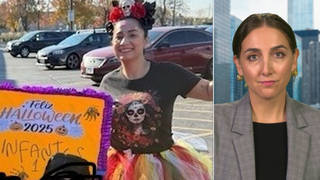
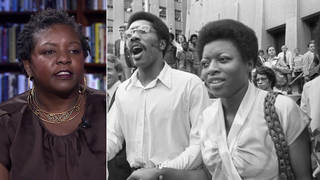
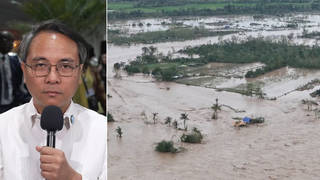





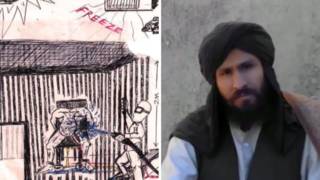
Media Options